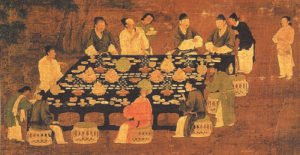Caffeine and L-theanine
The Benefits of Coffee and Tea: The Original Nootropics
Nootropics are one of the latest trends for keeping up with today’s fast-paced and increasingly challenging day-to-day living. Also known as cognitive enhancers, these supplements change your brain’s neurochemistry to improve specific mental functions such as cognition, memory, intelligence, motivation, attention, and concentration.
Now, that may sound like some high-tech kind of substance that confers superhuman abilities, like Spider-man’s uber-sensitive senses and reflexes. In reality, nootropics simply augment your existing mental abilities. While usage and effects of more modern substances are still debated among professionals, there are popular nootropics – some of the oldest known — which are ingested every day by lots of people.
You may even have had some for breakfast earlier, or you may be planning to have it later when you are already feeling groggy and tired. You may prefer yours to be topped with whipped cream and chocolate sprinkles to give you that much-needed energy kick, or perhaps you prefer it with honey and lemon to soothe your nerves.

Today, let’s take a closer look at the grandparents of nootropics. These two beverages are universally welcomed and consumed in any location, even up in the air while on a flight, where you can expect the lovely stewardess to ask which one you prefer — “Hi, would you like to have coffee or tea?”
Coffee and Tea: A History
While earlier accounts of people experiencing the energizing effects of coffee have yet to be verified, the earliest credible evidence of the beverage and its sources came from the mid-1400s somewhere in the Middle East. Coffee seeds were brewed and roasted with the purpose of keeping tribesmen awake for their religious rituals. Over the next centuries, this originally black and bitter drink reached different parts of the globe. Central America, for one, took an interest in cultivating the coffee plant in the latter half of the 19th century and continues to be the largest producers of the product up until today.

On the other hand, tea’s origins can be traced back to the ancient times somewhere in China, where evidence suggest that the beverage was taken as early as 2nd century BC by Han Dynasty emperors. Different ways to process the drink was also established — some by having the leaves steamed, fried, or boiled.
The spread of tea into different lands also gave birth to its variations, with the most notable of which is the British way of adding sugar and milk to the mix. Nowadays, the process has been simplified to produce the beverage in more convenient forms, like tea bags, where dipping them into a cup of hot water gives nearly the same effect as brewing it.
Caffeine — The Wonder Drug

The common component between coffee and tea is caffeine, a stimulant which affects several portions of the central nervous system or simply put, your brain and spinal cord. One of the most evident effects of this substance is its ability to reduce physical fatigue and prevent sleepiness, primarily by blocking the neurotransmitter adenosine, which is responsible for making you drowsy.
It also increases one’s focus and improves task performance even when sleep is minimal. A recent study from Johns Hopkins University also concluded that caffeine helps boost long-term memory consolidation. The required dosage to achieve these effects vary from person to person, although it is clear that continuous intake causes one’s tolerance to increase, meaning a larger amount is needed to have the same effect. And as with any other ingested substance, this is where moderation takes place.
The Effects of Coffee in Your Brain and Body

It is no wonder why you can find coffee shops in almost every corner of the street as its effects are felt almost instantly with just a sip. On a particularly slow and boring day, drinking coffee brings color to yourself and your output, giving you the energy needed to accomplish a challenging task.
Physical performance is also improved, thanks to the effects of coffee on the autonomic nervous system, more commonly known as the mechanism in charge of your fight-or-flight response. When coffee is in your system, the hormone responsible for this response (known as epinephrine or adrenaline), is increased, making the body prepared for intense physical exertion.
Aside from the active effects, coffee consumption has shown the potential to prevent certain diseases, such as Alzheimer’s or dementia, Parkinson’s, and even liver and colorectal cancer. Moreover, coffee also stimulates the release of dopamine, also known as the “happy” hormone, and helps lower the risk of depression, as evidenced by a Harvard research released in 2011. You also get a massive amount of antioxidants in each cup, which aids in the overall improvement of your health.
Tea: Nature’s Way of Saying, “Have a Great Day!”
Fun fact: Did you know that tea is the second most widely consumed beverage in the world after water? It comes in different forms, with a wide variety of leaves and mixes. And while tea has a considerably lesser caffeine content than coffee, it has almost the same advantages, as well as its own. Your concentration is improved just like the former, but with tea, you enter a state of quiet alertness, since it has calming effects to your nerves, contrasting coffee’s tendency to make some people hyper and jittery. This comforting effect is particularly beneficial on a stressful day, when you need to relax and lay low while still maintaining mental alertness.

It is also known to soothe even the digestive system, given its antispasmodic properties. It is customary for Chinese restaurants to serve tea while waiting for the main dish, and can actually improve your appetite as it prepares your stomach for the incoming feast. While your appetite may be increased, there are certain studies that show green tea helps reduce body fat by lowering LDL, or the “bad” cholesterol. A substantial amount of research has also linked tea and heart health, due to the same mechanism.
Lastly, a specific antioxidant contained in this beverage called EGCG, can help suppress lung cancer cell growth and inhibit breast cancer tumors, and is even acknowledged by the American Cancer Society. Thanks to the Ancient Chinese, it seems that we are on the right track to achieving a healthier life by consuming tea, one cup at a time.
Coffee or Tea?

Hearing about nootropics and its effects can both amaze and scare you, but don’t be intimidated by all of the fancy and technical words. These substances can actually help maximize the potential of your mental faculties, just like how the original nootropics, coffee, and tea, can help get you through the day.
Don’t believe us? See what Comparakeet had to say in their TruBrain review trubrain review.
Moreover, as you now know, the effects of these two beverages are not limited to your brain. They have benefits extending to the other parts of your body, and can possibly have other healthy effects that have yet to be discovered. A little boost can be a big help, and with these two, you can bring out the best in you. So what’ll it be – coffee or tea?
